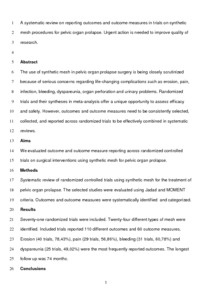de Mattos Lourenco, TR; Pergialiotis, V; Duffy, JMN; Durnea, C; Elfituri, A; Haddad, JM; Betschart, C; Falconi, G; Doumouchtsis, SK
(2019)
A systematic review on reporting outcomes and outcome measures in trials on synthetic mesh procedures for pelvic organ prolapse: Urgent action is needed to improve quality of research.
Neurourol Urodyn, 38 (2).
pp. 509-524.
ISSN 1520-6777
https://doi.org/10.1002/nau.23871
SGUL Authors: Doumouchtsis, Stergios
![[img]](https://openaccess.sgul.ac.uk/113700/1.hassmallThumbnailVersion/Manuscript%2BNAU.pdf)  Preview |
|
PDF
Accepted Version
Available under License ["licenses_description_publisher" not defined].
Download (65kB)
| Preview
|
Abstract
The use of synthetic mesh in pelvic organ prolapse surgery is being closely scrutinized because of serious concerns regarding life-changing complications such as erosion, pain, infection, bleeding, dyspareunia, organ perforation, and urinary problems. Randomized trials and their syntheses in meta-analysis offer a unique opportunity to assess efficacy and safety. However, outcomes and outcome measures need to be consistently selected, collected, and reported across randomized trials to be effectively combined in systematic reviews. AIMS: We evaluated outcome and outcome measure reporting across randomized controlled trials on surgical interventions using synthetic mesh for pelvic organ prolapse. METHODS: Systematic review of randomized controlled trials using synthetic mesh for the treatment of pelvic organ prolapse. The selected studies were evaluated using Jadad and MOMENT criteria. Outcomes and outcome measures were systematically identified and categorized. RESULTS: Seventy-one randomized trials were included. Twenty-four different types of mesh were identified. Included trials reported 110 different outcomes and 60 outcome measures. Erosion (40 trials, 78%), pain (29 trials, 56%), bleeding (31 trials, 61%), and dyspareunia (25 trials, 49%) were the most frequently reported outcomes. The longest follow up was 74 months. CONCLUSIONS: Most randomized trials evaluating surgical interventions using synthetic mesh for pelvic organ prolapse failed to report on clinically important outcomes and to evaluate efficacy and safety over the medium- and long-term. Developing and implementing a minimum data set, known as a core outcome set, in future vaginal prolapse trials could help address these issues.
| Item Type: |
Article
|
| Additional Information: |
This is the peer reviewed version of the following article: de Mattos Lourenco, TR, Pergialiotis, V, Duffy, JMN, et al. A systematic review on reporting outcomes and outcome measures in trials on synthetic mesh procedures for pelvic organ prolapse: Urgent action is needed to improve quality of research. Neurourology and Urodynamics. 2019; 38: 509– 524, which has been published in final form at https://doi.org/10.1002/nau.23871. This article may be used for non-commercial purposes in accordance with Wiley Terms and Conditions for Use of Self-Archived Versions. This article may not be enhanced, enriched or otherwise transformed into a derivative work, without express permission from Wiley or by statutory rights under applicable legislation. Copyright notices must not be removed, obscured or modified. The article must be linked to Wiley’s version of record on Wiley Online Library and any embedding, framing or otherwise making available the article or pages thereof by third parties from platforms, services and websites other than Wiley Online Library must be prohibited. |
| Keywords: |
core outcome sets, efficacy, outcome variation, pelvic organ prolapse, randomized controlled trials, safety, synthetic mesh, systematic reviews, Clinical Trials as Topic, Female, Gynecologic Surgical Procedures, Humans, Middle Aged, Outcome Assessment, Health Care, Pelvic Organ Prolapse, Research, Surgical Mesh, Treatment Outcome, Uterine Prolapse, Vagina, core outcome sets, efficacy, outcome variation, pelvic organ prolapse, randomized controlled trials, safety, synthetic mesh, systematic reviews, core outcome sets, efficacy, outcome variation, pelvic organ prolapse, randomized controlled trials, safety, synthetic mesh, systematic reviews, Urology & Nephrology, 1103 Clinical Sciences, 1109 Neurosciences |
| SGUL Research Institute / Research Centre: |
Academic Structure > Institute of Medical & Biomedical Education (IMBE)
Academic Structure > Institute of Medical & Biomedical Education (IMBE) > Centre for Clinical Education (INMECE ) |
| Journal or Publication Title: |
Neurourol Urodyn |
| ISSN: |
1520-6777 |
| Language: |
eng |
| Dates: |
| Date | Event |
|---|
| 8 March 2019 | Published | | 15 November 2018 | Published Online | | 24 September 2018 | Accepted |
|
| Publisher License: |
Publisher's own licence |
| Projects: |
|
| PubMed ID: |
30431183 |
| Web of Science ID: |
WOS:000460665400005 |
 |
Go to PubMed abstract |
| URI: |
https://openaccess.sgul.ac.uk/id/eprint/113700 |
| Publisher's version: |
https://doi.org/10.1002/nau.23871 |
Statistics
Item downloaded times since 29 Sep 2021.
Actions (login required)
 |
Edit Item |



